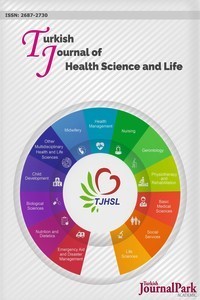Analysis of women's poverty experiences with grounded theory approach
Analysis of women's poverty experiences with grounded theory approach
Woman, poverty of women grounded theory.,
___
- REFERENCES 1.Çamur DG. Feminization of Poverty: The Case of Altındağ. Journal of Family and Society Education-Culture and Research 2010;21:19-29.
- 2. Moghadam VM. The ‘Feminization of Poverty’ and Women’s Human Rights 2005: http//www.unesco. org/shs/gender, Access Date: 18.09.2020.
- 3. Kümbetoğlu B. Poverty. Violence and Human Rights. In:Özdek Y (ed). Women and Poverty After Disasters. Ankara,TODAİE. 2005.
- 4.World Poverty Clock (WPC). Global Extreme Poverty 2019. https://worldpoverty.io/?utm_source=google&utm_medium=search&utm_campaign=Worldpovertyclock&campaignid=1695797724&adgroupid=71780550171. Access Date:22.03.2020.
- 5.TÜİK. Income and Living Conditions Survey 2019. https://data.tuik.gov.tr/Bulten/Index?p=Gelir-ve-Yasam-Kosullari-Arastirmasi-2019-33820. Access Date :20 March 2021. 6.OECD. Poverty Rate 2015. https://data.oecd.org/inequality/poverty-rate.htm. Access Date: 18.09.2020.
- 7. TÜİK. Poverty Study Results 2009. http://www.tuik.gov.tr/yillik/ısı göstergeler.pdf. Access Date: 18.09.2020.
- 8. Pearce D.The Feminization of Poverty: Women, Work and Welfare, The Urban & Social Change – Review Special Issue on Women and Work 1978;11(1/2):28-36.
- 9. Ulutaş ÇÜ. Feminization of Poverty and Invisible Labor. Work and Society 2009;2(21):25-40.
- 10. Rahnema M. A World Where Misery Repels Poverty. (Ş.Ünsaldı, Trans.) Ankara: Özgür University Publishing House, 2009.
- 11. Aragon J. Miller M. Global Women's Issues: Women in the World Today, Extended Version: United States Department of State, 2018.
- 12. Medeiros M, Costa J. What Do We Mean by Feminization of Poverty? International Poverty Centre 2008;58.
- 13. Razavi S. From Rags to Riches: Looking at Poverty From a Gender Perspective. IDS Bulletin 1997;28(3):49-62.
- 14. Strauss A. Corbin J. Basics Of Qualitative Research: Techniques and Procedures for Developing Grounded Theory, 2nd Ed. Thousand Oaks CA: SAGE Publications, 1998.
- 15.Creswell JW. Qualitative Research Methods: Qualitative Research and Research Pattern According to Five Approaches. Bütün M, Demir SB, (eds). 3rd Ed. Ankara: Siyasal Publishing, 2013.
- 16. Charmaz K. Grounded Theory Constructing, (Trans. Ed. Rabia Hoş), 2nd Edition, Ankara: Seçkin Publishing, 2015.
- 17. Yazıcıoğlu A. A Theory Based On The Changes That Retirement Brings In The Social Life Of Women.( Master Thesis ). Ankara: Hacettepe University Institute of Social Sciences, 2006.
- 18. Çelik H, Ekşi H. Qualitative Patterns: Grounded Theory. İstanbul: Edam Publications, 2015.
- ISSN: 2687-2730
- Başlangıç: 2018
- Yayıncı: Mümin POLAT
Abdıkadır AHMED OMAR, Deka ABDİRİSAK
Özgür ÖNAL, Kıymet BATMAZ, Ayşe YILDIRIM UZ, Ersin USKUN, Ahmet Nesimi KİŞİOĞLU
The Effect of Coronavirus Fear on Cyberchondria Level in Students Studying in the Field of Health
Belkıs KOÇTEKİN, Volkan KARAKUŞ, Erdal KURTOĞLU
Hasan SAĞIR, Bilge BAL ÖZKAPTAN
Mukadder İnci BAŞER KOLCU, Gülter Devrim KAKİ
Ayşe MEYDANLIOĞLU, Azime Özlem ARICAN
Şükriye YEŞİLOT, Mehmet Kaya ÖZER, Fatih GÜLTEKİN, Meral ÖNCÜ, İbrahim Aydın CANDAN, Birsen HARUN DAĞDEVİREN, Ekrem ÇİÇEK
Analysis of women's poverty experiences with grounded theory approach
